Arabella Ann Chandler Parkinson
(1824–1894)
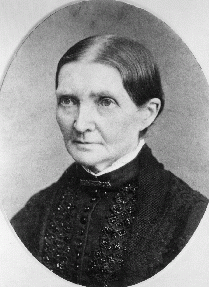
by Benson Y. Parkinson
(October 2002)
Arabella Ann Chandler was born February 27, 1824, in Cheltenham, Gloucestershire, England, the fourth child of George Chandler and Esther Glover. The family group sheets give her name as Arabella, though in her history her children George and Caroline call her “Arabell Ann,” so maybe that’s how she pronounced her name. Arabella’s parents had thirteen children, of which seven died in childhood. George and Caroline describe their grandparents this way:
“George Chandler was an unusual character, being high-minded, strict in his habits, exacting in his discipline, and immaculate in his dress and personal appearance. Everything about him, both in private and in public, must conform to his social ambition. He would not recognize his own children until they were up to his standard in personal appearance.
“. . . Esther Glover, was of modest disposition, highly refined, naturally artistic, scrupulously clean, and possessed of unusual executive ability. Arabell Ann inherited these characteristics from her parents.”
The Chandlers went to church and read the Bible in the home.
Arabella’s family was prosperous. She went to school, studied literature, and spent a lot of time horse back riding. But then her father suffered a financial reversal. Much of their property was tied up in litigation and was never recovered. Arabella learned dress-making and millinery (women’s hat making) to help support the family. George died in 1839, when Arabella was about 15. Before long, Arabella was supporting her mother and brother Frederick, who was only 5 when their father died.
In 1842, Esther, Arabella, and Frederick were baptized into The Church of Jesus Christ of Latter-day Saints. Arabella was 18 at the time. Arabella did missionary work by distributing tracts door-to-door in Cheltenham. In 1849, when Arabella was 25, her mother died. Arabella’s sister Clarissa and her husband John Alder, a member of the Church since 1842, emigrated to St. Louis in 1850.1 Arabella saved her money and earned enough for her and Frederick to follow them in 1851. They sailed with a company of Saints on the George W. Bourne to New Orleans and then by riverboat to St. Louis. Arabella worked at dressmaking and millinery to try to earn enough money to continue on to Zion. She met a recent convert, Samuel Rose Parkinson, also English, and married him on January 1, 1852. She was 27 at the time, and he just 20.
Samuel was doing well as a drayman (someone who hauls things for a living), owned his teams, and had money in the bank. Their first child, Samuel Chandler, was born February 23, 1853. The Parkinsons left their home and business in 1854 to come to Utah, bringing Frederick as well as Samuel’s little sister Lucy with them. Arabella had to cook over buffalo chips, and once they saw a buffalo stampede. They encountered Indians, including a party of 350 fresh from raiding, whom the pioneers fed and gave gifts. The Parkinsons and their company narrowly escaped a massacre at Fort Laramie.
Arabella and Samuel moved first to Kaysville. Samuel built her a log house with a dirt roof and a dirt floor. On August 1, 1855, she had a girl, Charlotte, and the next day, August 2, Charlotte’s twin brother, William. Arabella was in bed with them when a storm blew a part of the roof off the house, drenching mother and babies with rain and mud, but they pulled through. Samuel gardened, raised stock, ran a threshing machine, and worked on the fort. Arabella kept house and sewed for her family and for hire. Their son George was born July 18, 1857. Samuel was called up in the Utah War and spent much of that winter on guard duty in the cliffs in Echo Canyon. On July 7, 1859, they had another son, Franklin. Arabella’s brother Frederick got restless in Utah and, contrary to the counsel of Brigham Young, left for California to look for gold. He wrote for a while but then stopped, and though they tried to find him and reestablish contact, they never could. Arabella sorrowed over him as long as she lived.
In the spring of 1860, the Parkinsons joined 12 other families who moved to Cache Valley and settled along the Muddy River. They called their village Green Meadows. When President Brigham Young visited in July to organize the ward, he asked them to change the name of the river to Cub Creek and the name of the town to Franklin, after Apostle Franklin D. Richards, and they obliged. For the first few years they thought they were in Utah, but when the surveys came through, Franklin proved to be the oldest town in Idaho. Samuel farmed, hauled goods to Montana, and started a store in their house. Arabella made soap, molded candles, cured meat, made the buckskin shirts and trousers that her husband and sons wore, wove the linsey-woolsey cloth (a course mixture of wool and linen or cotton) and sewed the dresses that she and her daughters wore. Often she used horsehair for thread.
Samuel worked on ditches, helped build the school, and served as constable and as a minuteman—they rode out in response to Indian raids every year. Arabella was tending store one day when an Indian man came in and threatened to kill her if she didn’t give him liquor. She kept cool and ordered him from the store, and he obeyed. Arabella’s and Samuel’s second daughter, Esther, was born February 2, 1862.
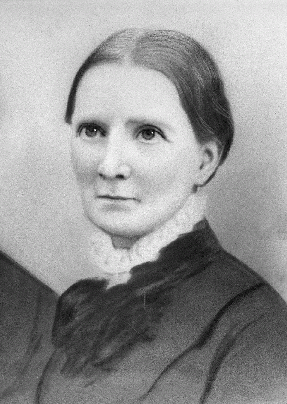 |
| Arabella during her trip to St. Louis, 1879 |
In 1863 the U.S. Army attacked the Shoshoni on Bear River, 12 miles north of Franklin, killing many hundreds of men, women, and children. The Mormons helped care for the survivors on both sides. Arabella and Samuel took in a Shoshoni boy who survived the massacre and raised him, giving him the name of Shem Parkinson. Shem was by some accounts an angry boy, hard for Arabella to handle, and even pulled a knife on Samuel once. But he joined the Church and became a deacon. He died of quick consumption in 1881. Arabella’s son Albert was born August 8, 1863 but died at 9 months. Arabella’s children write: “This caused her great sorrow. However, there were so many responsibilities crowding on her that she was forced to dismiss her sorrow as much as possible to carry out her duties.” Clara was born April 18, 1865 and Caroline November 10, 1866, making five boys and four girls born to Samuel and Arabella.
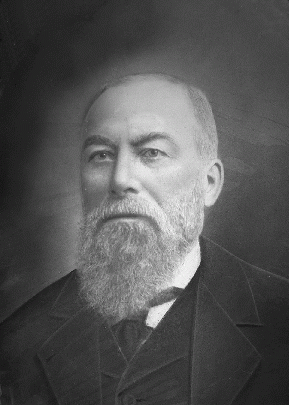 |
| Samuel, probably 1900 |
Samuel was doing well now at farming, freighting, and managing the store. According to his daughter Vivian, Samuel and Arabella discussed plural marriage even before they married. Samuel told Arabella: “You know, I know that’s true, that church. And if I join it I’m going to join it whole hand or none. And that means if there ever comes a time I think I should take another wife, I’m going to do it. So now you make up your mind because that’s what I’m going to do.” After getting Arabella’s consent, Samuel made cautious inquiries about marrying Charlotte Smart, the daughter of his friend and business partner Thomas S. Smart. Charlotte was willing but on her father’s advice told Samuel to wait a year. She also asked him not to court her during that time, out of consideration for Arabella. They talked only briefly at Church functions, danced at parties, and were rarely if ever alone. Samuel married Charlotte in 1866. He was 35 and Charlotte 17. Arabella, age 42, had given birth to Caroline, her youngest, just a month before. Samuel married Charlotte’s sister Maria two years later, when Maria was also 17. According to George and Caroline, Arabella lived the law of Sarah: “She knew by the revelation from God that her domestic life for time and all eternity was involved in . . . the celestial order of marriage, and upon this conviction she stepped forth and gave her husband these two wives to become the mothers of his children.” Charlotte tended Arabella’s children so Arabella could be present at Maria’s wedding.
Samuel rotated between wives, a week at each. Arabella had a house, and Charlotte and Maria lived for years in separate rooms in another one. Between the three families Samuel eventually had 32 children. The various histories depict Samuel’s homes as happy and say all three wives were peacemakers and devoted to their families. Arabella’s children were having children at the same time as the other wives, which must have meant Samuel’s two younger families got an extra portion of his attention. He had other demands that kept him away as well. He became the manager of the Franklin Co-op, which included a woolen mill and other undertakings besides the store. He served as a counselor in the same bishopric for 30 years, which they figured was a record. In 1873 the Church sent him on an exploration mission to Arizona. He went to prison for polygamy for five months in 1886. Arabella asked if she could send a bed with him, and the marshal said no, just a quilt and pillow. So she made him a quilt with eight pounds of wool. She sent him care packages with cakes, candies, and fruit. She kept the family going and looked over his financial affairs while he was gone.
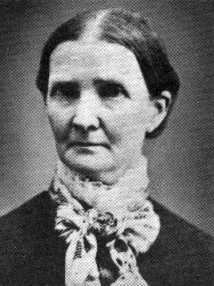 |
 |
| Arabella | Samuel, probably a little younger than 50 |
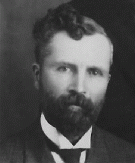 |
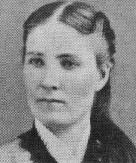 |
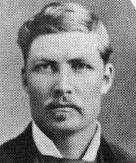 |
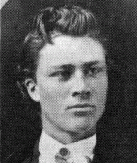 |
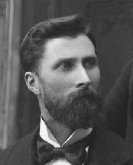 |
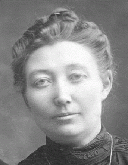 |
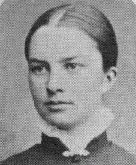 |
 |
| Arabella and Samuel’s children Top, L-R: Samuel, Charlotte, William, George Bottom: Franklin, Esther, Clara, Caroline |
|||
Arabella was thin, of medium height, with brown, wavy hair and brown eyes. Her children write that “her integrity was unimpeachable and that she was trustworthy in all her social and business transactions in life and has carefully trained her children in habits of industry, economy and strict morality. . . . She could endure long hours and was extremely patient and kind. She rather shunned public notoriety. She was very sensitive in the care of her husband especially when he was suffering with severe headaches.” They note: “She seldom gave a distinct order or made a rule. Her children learned from early infancy, from her attitude of mind, that if a thing were right it must be done and there ceased to be a question about it.”
Arabella made one trip East that we know of, to St. Louis in 1879, 25 years after leaving. Samuel needed to buy equipment for the woolen mill, and Arabella accompanied him. They visited Samuel’s stepfather and brothers and sisters and Arabella’s sister Clarissa.
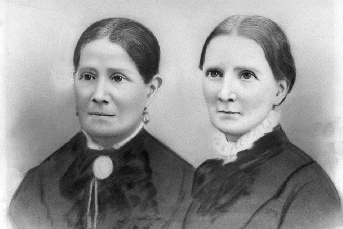 |
| Arabella (right) with her sister Clarissa during her 1879 trip to St. Louis |
Samuel built Arabella a large new house in Franklin, and when he got out of prison for polygamy, she had the idea of having a party for all the old folks in town. They issued invitations to all over 60, “regardless of creed or color,” as well as missionary wives, widows, and orphans. The party was such a success they decided to hold them every year. Samuel held weekly “home nights” for his three families and once a month at Arabella’s for all the families. (This was years before the Church adopted the family home evening program.) They’d visit, talk about family problems, have treats, and entertain. As the kids left home, the three families began gathering for an annual reunion at Arabella’s. Samuel used to call them “heaven on earth.” One of Arabella’s last requests was that the family keep her home when she died as a gathering place for the annual reunions.
Arabella developed cataracts as she aged, so her sister-wife Charlotte would send her boys up to get her wood, and her girls to help with her cleaning. She died August 9, 1894. The doctor said she had no disease but that her vital organs had worn out. Samuel died 25 years later at age 88 in 1919.
Notes
1. Clarissa Chandler Alder may have been a member at this time also. We know she was baptized in 1882, but members were often rebaptized as a way to renew their covenants. John Alder died in 1852 in St. Louis. Clarissa then married Thomas Binnington.
Histories
- George C. Parkinson and Caroline C. P. Goaslind, “Biography of Arabell Ann Chandler Parkinson.” A very adulatory history written by two of Arabella’s children. My history is largely an abridgment of this one. I have seen this history in at least two versions. One includes family data from a 1935 family reunion. Another brings it forward to 1947 and adds her physical description, etc., but omits important details from the earlier version.
- William H. Smart, “Arabella Ann Chandler Parkinson," obituary, Deseret Evening News, 23 Aug. 1894. This is not as detailed but does give the important fact of Arabella’s tracting in Cheltenham.
- Benson Y. Parkinson, “Samuel Rose Parkinson (1831–1919)” (Oct 2002). A companion piece to this—numerous details of Arabella and Samuel’s life together. See also sources listed there.
- Preston Woolley Parkinson, The Family of Samuel Rose Parkinson (2001). Preston is a grandson. His treatment of Samuel includes many details of Arabella’s life.
- Lydia Dunford Alder, “Reminiscences of the Pioneers of 1854”; Improvement Era, July 1908, 708–13; “The Massacre at Fort Laramie,” Improvement Era, June 1909, 636–38. Lydia married George Alder, Arabella’s sister Clarissa’s son. These articles give several of Samuel and Arabella’s experiences crossing the plains.
- Thomas Ambrose Poulter, in Utah Pioneer Biographies (1964), 44:139–41, available at the Family History Library. More pioneer experiences by a trailmate.
- Samuel Rose Parkinson, Founders’ Day Speech (1911), in Lester P. Taylor, Samuel Rose Parkinson: Portrait of a Pioneer [1977], 77–79. Details of early life in Franklin.